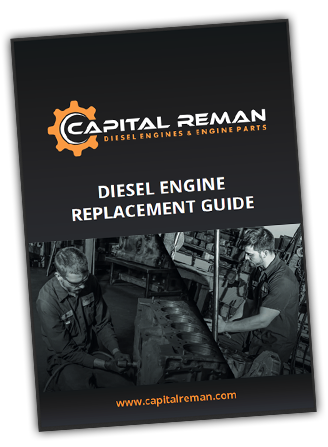Why Do Diesel Engines Last So Long?
 Our good friend "Adept Ape" who is a master engine builder and YouTube Blogger recently released a video breaking down the various reasons why diesel engines last so much longer than gasoline engines. Let's dive in and discuss the three major reasons why diesel engines are so durable:
Our good friend "Adept Ape" who is a master engine builder and YouTube Blogger recently released a video breaking down the various reasons why diesel engines last so much longer than gasoline engines. Let's dive in and discuss the three major reasons why diesel engines are so durable:
Diesel engines continuously run 1,000,000 to 1,500,000 miles before major overhaul. They are 3 major reasons why they last so long:
- Design
- Fuel
- Application Differences
Diesel Design and Engineering
The first reason why diesel engines last so long compared with gasoline engines comes from the most basic design differences between the two engines. A Chevy 350 Small Block vs. a CAT C15 engine just in terms of size is the most obvious difference. The crankshaft, camshaft and cylinder heads are all much larger. Internally, diesel engines have much larger bearing sizes which means more oil clearance. More oil lubricating the parts equals less wear. Diesel engines also have a much larger oil capacity. A gas engine will use roughly 1 gallon of oil vs. a CAT C15 will use about 15 gallons of oil. Diesel engines are gear driven. There are no timing belts or chains that stretch or break. Gears are fixed and never lose their timing. Most diesel engines use water pumps and oil pumps that are also gear driven. Non gear driven pumps fail more easily than gear driven ones. When it comes to keeping the engine cool diesel engines simply do it better than gas powered ones. Diesel engines have multiple sensors and thermostats so in case one fails the whole engine doesn't overheat. Multiple piston cooling nozzles makes sure that the keepers always stay cool and that there is a constant stream of coolant flowing throughout the engine.
Diesel engines are gear driven. There are no timing belts or chains that stretch or break. Gears are fixed and never lose their timing. Most diesel engines use water pumps and oil pumps that are also gear driven. Non gear driven pumps fail more easily than gear driven ones. When it comes to keeping the engine cool diesel engines simply do it better than gas powered ones. Diesel engines have multiple sensors and thermostats so in case one fails the whole engine doesn't overheat. Multiple piston cooling nozzles makes sure that the keepers always stay cool and that there is a constant stream of coolant flowing throughout the engine.
In addition to more oil and coolant capacity diesel engines are simply built with heavy duty components that wear out less frequently. Diesel engines are built with a simple yet durable valve train. The rollers are harder and more solid than in gas engines and there are no hydraulic lifter failures to worry about. Overall, the camshaft lobes, lifters and rockers are all much longer and built to withstand more heavy duty conditions. Coatings on all surfaces are reinforced with various composite materials to make them harder. Diesel engine parts are tested via a Rockwell Hardness Test to determine quality.
Diesel Fuel vs. Gasoline
The second reason diesel engines are more durable than gasoline engines is the diesel fuel itself. Diesel fuel has the consistency of a light oil which means it lubricates as it flows within the cylinder. Gasoline is more of a solvent. Solventstend to be more acidic and burn away at surfaces and they act as poor lubricants. That being said, the gasoline will eat away at the lubricating oil designed to keep the piston cylinder rings from wearing. Diesel fuel is simply less volatile than gasoline. Diesel fuel can only ignite via compression versus gasoline which will ignite with a simple spark. The chemical reaction of fire to gasoline is much more violent in the engine in terms of force on ancillary components.
RPM Differences Between Diesel Engines and Gas Engines
 The third and final reason why diesel engines will last longer than gasoline engines is in how they are used. A diesel engine will push about 1300-1600 RPMs vs. a gasoline powered engine will do 2500-3500 RPMs. That means a gas engine is doing roughly two times the amount of revolutions per minute than a diesel engine. That is simply more wear on the internal components of the engine. Roughly 75% of engine wear occurs when the engine is heating up. Over-the-road and off-road diesel engines are only typically started only once or twice a day. Semi-trucks go long stretches without powering down and it isn't uncommon to do 300 miles in one stretch. In a gas powered cars the engine is started up multiple times per day; once in the morning to go to work, another time to run to lunch, another time to run to the bank etc... Each stretch usually only lasts 10 miles or less which means the engine never gets up to maximum temperature for extended periods. With diesel engines there is one temperature all day with much fewer heat and cool down cycles.
The third and final reason why diesel engines will last longer than gasoline engines is in how they are used. A diesel engine will push about 1300-1600 RPMs vs. a gasoline powered engine will do 2500-3500 RPMs. That means a gas engine is doing roughly two times the amount of revolutions per minute than a diesel engine. That is simply more wear on the internal components of the engine. Roughly 75% of engine wear occurs when the engine is heating up. Over-the-road and off-road diesel engines are only typically started only once or twice a day. Semi-trucks go long stretches without powering down and it isn't uncommon to do 300 miles in one stretch. In a gas powered cars the engine is started up multiple times per day; once in the morning to go to work, another time to run to lunch, another time to run to the bank etc... Each stretch usually only lasts 10 miles or less which means the engine never gets up to maximum temperature for extended periods. With diesel engines there is one temperature all day with much fewer heat and cool down cycles.
All of these issues and more will make a diesel engine last 1,000,000 miles or more versus 200,000 if you are lucky with a gas powered engine but each motor is different. If you take care of any engine with regular maintenance and don't let the engine get hot it will last a long time. Take a look at the video below for the entire analysis from "Adept Ape":




